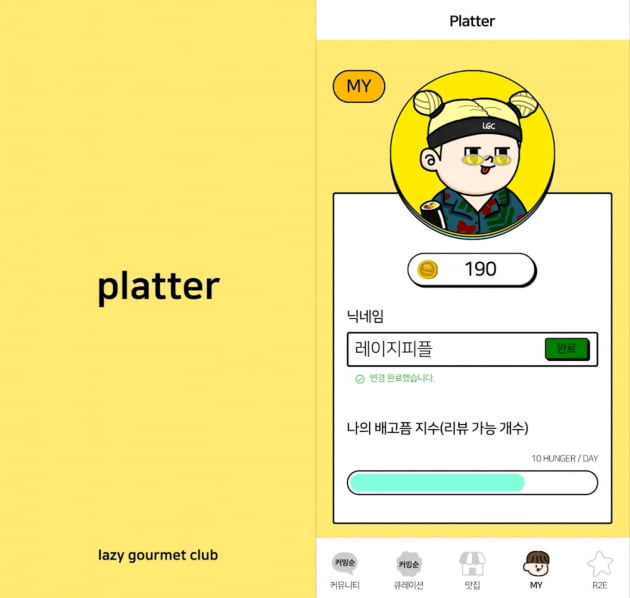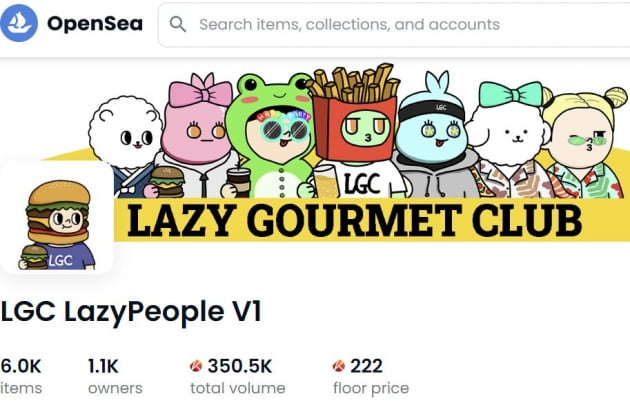Restaurant apps are also in the era of 'decentralization'... "If …
본문
Interview with the executives of the gourmet NFT project 'Lazy Gome Club'
Restaurant Map App 'Platter' Beta Launch... Byte Token Listing Plan
Collaboration to develop 'NFT authentication technology'... Expected to open 10 'Legocle' branches within this year
The first NFT, a 5-fold increase in value compared to Mintinga… "Global Expansion Goal"
"I hope that many people who truly love food will gather in the community."
Cho Hyeong-won, strategic planning manager who runs the Lazy Gourmet Club (LGC), a non-fungible token (NFT) project for gourmets, said in an interview with Blooming Beat on the 28th, "I hope you don't look at our NFT too much from an investment point of view. “This is our operating philosophy.
Lazy Gome Club is an NFT project operated by the food material distribution platform 'Farmers Porter'. Farmersporter, which started as a food startup in 2018 and is currently recording about 4 billion won in annual sales, has acquired and operated four restaurants, including a gas station in D-Tower, Gwanghwamun.
Lee Do-hyung, CEO of Farmers Porter and Lazy Gome Club, introduced that he started the project after judging that NFTs could serve as a stepping stone to link F&B and IT.
The difference between the Lazy Gome Club project is the platter application (app) under development.
Platter is a restaurant review app that claims to be a 'secret restaurant map created by gourmets', and the beta version was officially opened on Android and Apple iOS on the 18th. The goal is to provide participants with quality restaurant information that is not polluted by huge platforms and advertisements through decentralized reviews.
In the current beta version, only holders of the Lazy Gome Club NFT can leave reviews on the platter, and other users can read reviews left by holders. In the future, it plans to introduce an evaluation function for reviews to enhance the reliability of the reviews themselves.

Platter also applied the concept of 'Review to Earn' to introduce a system that grants 10 byte tokens whenever a holder leaves a review. In the case of Byte Token, we are planning a route to be listed overseas and then listed in Korea.
CEO Lee said, "Originally, we planned to establish a corporation in Singapore around the fourth quarter of this year and proceed with an initial coin offering (ICO)."
He added, "Starting with MEXC and Huobi, we plan to list Byte tokens on overseas exchanges such as the three major global virtual asset exchanges (FTX, Binance, Coinbase) and then proceed with listing on domestic exchanges."
The first official version of the platter app is expected to be released later this year.
The Lazy Gome Club team is also accelerating the development of an 'invisible QR code' that can easily authenticate NFTs owned by holders offline.
Manager Jo explained, "Since NFT NYC, which was held in New York last month, there has been a trend that emphasizes the interface between NFT and offline. As a result, there is a lot of demand for technology to authenticate NFT offline in the market."
Lazy Gome Club plans to lead the popularization of NFT through participation in Ground X Grid, Kakao's blockchain technology affiliate, and NFT authentication technology collaboration with Plan X.

First of all, at the private party held on the 29th to commemorate the opening of the 'Cotella by LGC' tequila bar located in Apgujeong, we are considering a plan to allow holders to authenticate their NFTs to enter. It will also provide benefits such as menu discounts and free drinks based on certification.
Meanwhile, Lazy Gode Club is expected to launch a restaurant under the name of Lazy Gode Club in a large complex mall, starting with a bar in Apgujeong. Currently, it is known that a number of businesses, including Lotte Department Store Myeongdong and Dongtan, have inquired about entering the store.
“Our goal is to open 10 branches by the end of this year,” said CEO Lee. “We plan to steadily increase the number of affiliates, such as enabling meal tickets or coupons to be purchased with byte tokens from F&B collaborators,” he said.
Previously, in January of this year, Lazy Gome Club conducted the first 'LGC LazyPeople V1' NFT minting based on Kakao's blockchain Klaytn. A total of 6,000 randomly composed profile picture (PFP) NFTs were issued for 3 days, and all were sold out in about 5 seconds every day. The minting price was 45 to 50 KLAY (approximately 75,000 won) per piece at the time.
Manager Joe said, "It seems to have attracted attention because of its high accessibility as it is a food culture-based project among food, clothing and shelter," and added, "There are currently more than 1,100 holders."

As of the 28th, about six months after the first minting, the floor price (based on open seed) of the Lazy Gome Club NFT is 222 KLAY. Compared to the time of minting, the value has increased by about 5 times. However, during the same period, Klaytn’s price (based on CoinMarketCap) has fallen fivefold from 1,500 won per coin in January to the current equivalent of 300 won. In other words, the decline in the coin offset the increase in the project value.
Manager Cho said, "It's unfortunate that the price of Klaytn has fallen a lot recently, but the value of the project itself has risen a lot, so the damage is small."
He added, "There is no plan for the second minting in Korea yet," adding, "If we are going to do V2 minting, we are considering going in Japan. Japan is also a country with a very developed gastronomy."
In the future, we plan to expand the project to the global market. The purpose is to allow more people in each country to share restaurant information and enjoy food culture.
CEO Lee emphasized, "There are restaurants in any city," and "after stabilizing the service in Korea, we plan to move from Japan to all of Asia. Eventually, we will advance to North America."

